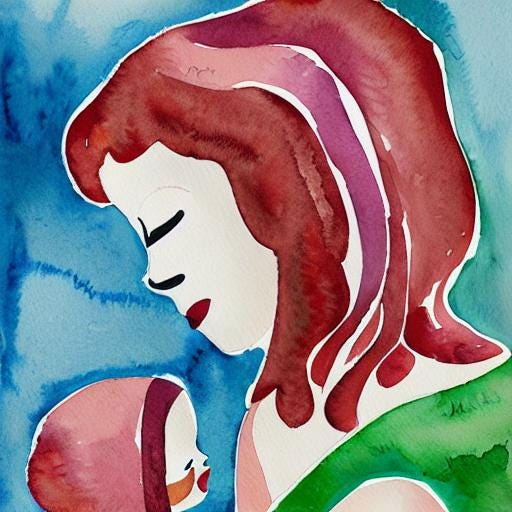Love at first sight?
The Unscripted Realities of Motherhood: A Deep Dive into Pregnancy Narratives, Bonding Mechanisms, and the Evolution of Love
In the captivating tales shared by my wonderful clients, I've embarked on a journey through a kaleidoscope of pregnancy narratives – from Amy's meticulous planning and by-the-book pregnancy journey to Lucy's years-long quest marked by heart-wrenching losses, and Emma, a seasoned mom of two who found herself on the surprise train to Babyville once again. Each woman, with her unique story and path, shared a common revelation:
They didn't instantly fall head over heels in love with their baby the moment they laid eyes on them.
(dreadful silence)
Hold on, what? Isn't that the magical moment we're all supposed to experience? The moment society, friends, and those picture-perfect Instagram posts assure us is etched into the covers of glossy magazines? A mother with glistening, wide-open eyes, adoringly gazing at her perfectly rounded baby?
No wonder they felt cheated. No wonder they felt not good enough. No wonder they felt they failed starting from the first second of their motherhood journey. And then, a few weeks or months later, we were starting a different conversation. Not about expectations, a fairy land, but about the FACTS.
And the facts are that 40% of new mothers DO NOT fall in love with their baby.
One study revealed that as many as 40% of first-time and 25% of second-time mothers recalled feeling indifference when holding their baby for the first time (Robson & Kumar, 1980)
“Hold-on a moment” number 2. Do you get this right? 40%?! How come nearly half of the women do not love their baby straight after birth? Shouldn't that be NATURAL for us?
Firstly, it is natural to bond with your baby straight after birth (hello, oxytocin). However, it is also natural not to. How? There are theories that say the bonding that does not happen straight away after birth is also a normal part of the process and can be protective for a mother just in case the baby will not survive. It sounds really dark; however, we need to remember that for a cavewoman (and biologically, we still carry this evolutionary blueprint), not bonding straight away with an infant whose chances of survival are low was a powerful PROTECTIVE MECHANISM.
Okay, you can agree with that. But, you can argue, that nowadays survival rate is really high, so why has that not changed? The reason for that is simple: Evolution needs millions of years, not a few thousands, to really change the species.
Secondly, there are other factors that can impact that initial bonding:
Birth can be a traumatic process for some women - for some women, they still feel pain from the last contraction when the baby is given to them. Simple, the pain and shock take over the love. And that is also natural and part of our survival blueprint.
C-section - some mothers can feel that they did not give birth to the baby, rather the doctors. Mothers who undergo unplanned C-sections may grapple with feelings of detachment, as the birth experience may differ significantly from what they envisioned. Processing these emotions is a crucial step toward building a strong bond.
Discrepancy between expectations and reality - for all these months, a woman was planning a beautiful trip to an exotic island but ended up in the Arctic.
Unexpected Health Complications - If the baby faces unexpected health issues requiring medical attention, the stress and anxiety around the situation can temporarily overshadow the bonding process.
Coping with Feelings of Failure and Not Being Good Enough
Navigating through feelings of failure, not being good enough, or lacking an immediate bond with your baby is a common and valid experience. In the journey of motherhood, where tales unfold uniquely, it's essential to unravel the layers of emotions with care.
Share your heart with someone you trust, whether it's a partner, friend, family member, or a supportive healthcare professional. Opening up about your emotions can lift the weight and invite invaluable understanding.
Embrace mindfulness as a gentle guide through the labyrinth of emotions. Simple acts, like mindful breathing or savouring quiet moments with your baby, can become bridges to a deeper connection. I will write down a separate post about mindfulness in perinatal period, so stay put!
Practice self-compassion; remind yourself that every mother's journey is a unique tapestry. Motherhood is a transformative process, and the timeline of bonding is as varied as the stories we weave. And you are doing your best in the difficult situation. Try not to beat yourself up; you need a supportive friend within you, not a critic.
Consider seeking professional support from a therapist or counsellor specializing in post-partum mental health. Their expertise can illuminate the path to self-discovery and resilience.
Connect with fellow mothers through support groups or online communities. Sharing experiences can illuminate the common threads that weave through the fabric of motherhood.
Patience and time are your allies. Understand that the intricate dance of bonding unfolds gradually; it does not happen overnight. Each shared moment contributes to the building of connection.
Journal your journey, capturing the nuances of emotions, challenges, and moments of joy. Your reflections can be a testament to your strength and a source of empowerment.
Remember, motherhood is a mosaic, and every piece, no matter how unique (or ugly at times), contributes to a whole. By embracing support, practising self-compassion, and honouring the individuality of your experience, you pave the way for a profound and authentic connection with your baby.
Let's unravel the mystery together. 🌟 #LoveUnscripted #PregnancyRealTalk #UnscrewingMotherhood #LetsTalkReal #BondingAndBeyond #MotherhoodJourney



